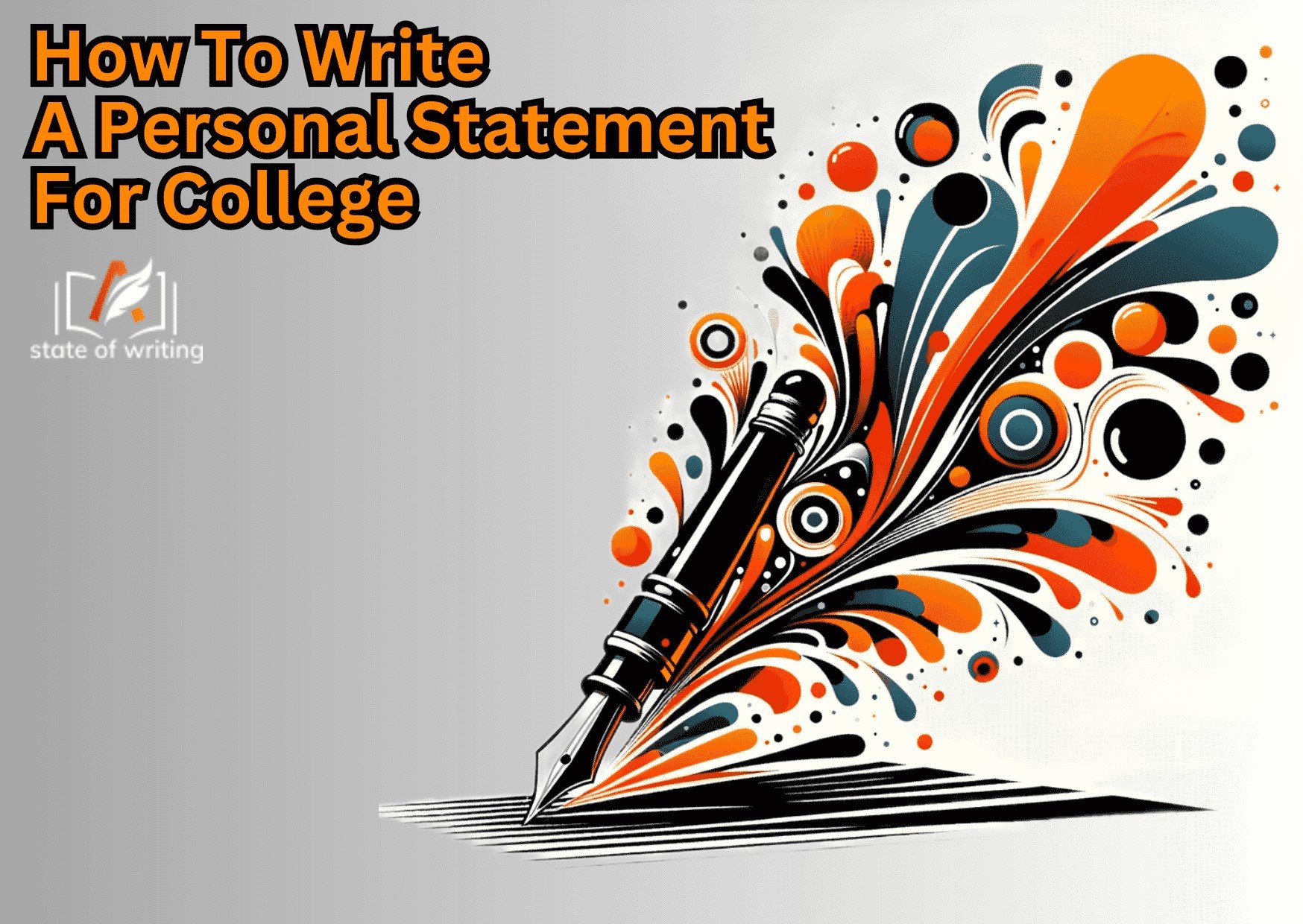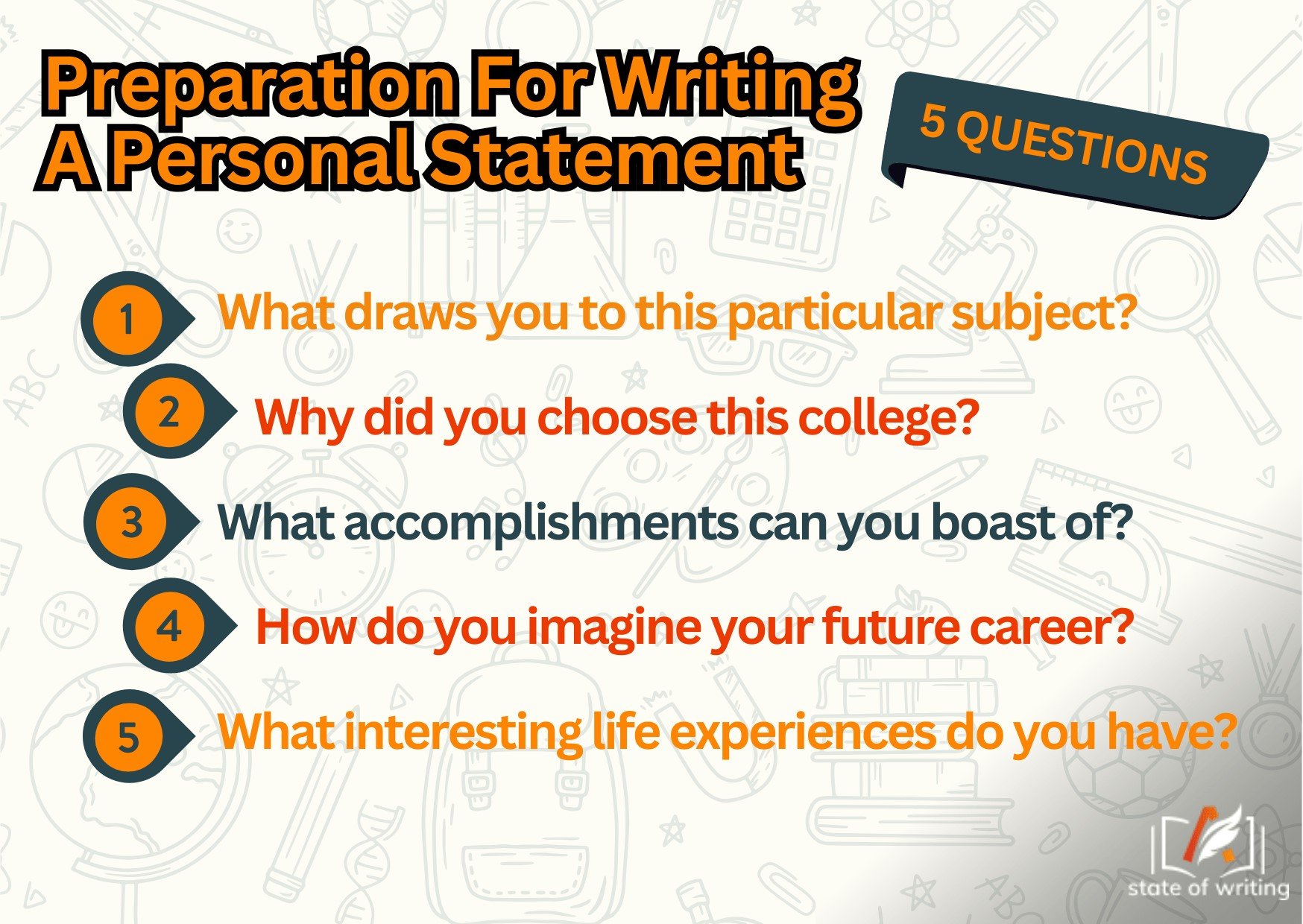 Ruby Butz
Ruby Butz

Students who hope to join UK colleges must show themselves as good writers. If you ever Googled how to write a personal statement for college, you probably understand this unfortunate fact. A personal statement is an essay demonstrating how your unique qualities, life experiences, and academic interests make you worthy of admission to a specific university or a scholarship. You can’t evolve educationally without writing it, meaning you must develop the most interesting essay topics and then apply all your skills to write fantastic papers. You’ll need knowledge, too, and that’s what StateOfWriting can give you. Our guide explains how you should approach personal statement writing in detail; it offers tips and advice from experienced writers who’ve succeeded with their applications. Learn with us and regain confidence in your abilities!
How to Write a Personal Statement for College in the UK: Ten Steps
A good personal statement must stand out. You probably scoff at this, thinking it’s easier said than done. Writing something special might be tough, but when you spend years in the academic market, this task seems like a piece of cake. Our college essay writing service has listed all the steps students must take. Follow them closely:
- Choose Your Approach: Before writing a college application personal statement, select your approach. While this paper must follow standard UK academic rules, it allows for some creativity. You can pick a traditional tone to combine formal writing with personal details, but if you don’t mind being bold, go for something more original. For example, use humour. An endless number of creative approaches might work, separating your essay from everyone else’s.
- Develop a Powerful Hook: Every strong personal statement template for college starts with a hook. It’s the first sentence your readers will see, so it has to grab their attention. You can use a moving claim that plays on their emotions, a relevant quote, or something equally impactful. Make your audience remember you from the start.
- Tease a Compelling Background: All personal statements for college begin with an introduction. It shouldn’t take more than 10% of an entire word count; you must make it concise but alluring. Spend a few sentences forming an introduction by mentioning your life's key details and main academic achievements.
- Create a Thesis to Express Your Interest: A thesis is the last sentence of the introduction that discloses the essence of your essay. In it, you must articulate why you’re interested in a specific college and show how it relates to your personality and experiences.
- Show Your Academic Interests: When writing a personal statement for college, devote a lot of content to your academic qualifications. Perhaps you want to become a literature major — mention winning a reading competition. Additionally, describe your experience with writing, indicate what made you fall in love with this subject and how it progressed until you decided to major in it.
- Present Your Sincere Self: Share your feelings. The committee wants to see real students, not robots obsessed with studies. Select a turning point in your life — any event that defined you is suitable. Be sincere with your readers.
- Build the Link between Education and Self: Look at any successful college application example — it combines academic and personal facts equally. Connect the impactful event you described with your achievements and knowledge, then create a bridge between them, showing how one affects the other. Using the literature example, you could say how getting lost in the crowd as a child scared you so much that you chose to imagine yourself as your favourite book hero, acting as they would. This stimulated your fantasy, taught you how to fight fear, and now you’re so full of love towards literature that you want to make studying it your life goal.
- Reference Your Chosen Course: What is a personal statement for college? Colleges like when students express their interest in a specific course. Mention some details about it. Reveal what you would like to study; name topics that fascinate you most.
- Explain How It Meets Your Objectives: Discuss how the course’s objectives align with your own and how they can help you succeed in your future career.
- Make a Promise to Your College: In conclusion, guarantee that you’ll be a diligent student and underline in what way you’ll be able to make your professors proud.

Questions to Answer Before You Write a UK Personal Statement for College
Planning your statement is as important as actually writing it. Asking yourself several key questions is a great way to set a specific direction for your future paper — they can guide you, helping you develop relevant answers. Here are some ideas.
- What draws you to this particular subject?
- Why did you choose this college?
- What accomplishments can you boast of?
- How do you imagine your future career?
- What interesting life experiences do you have?

What the Admission Panel Is Looking For
All our writers know how to write a college personal statement because they’ve done it before. Their success taught them the essential basics of such writing, and their experience with other students’ tasks solidified their understanding and boosted their creativity. They know what admission tutors search for. Some examples:
- True passion. Quality application writing must be personal. Using passion to express your personality and vision is a great way to earn the committee's regard. Don’t overdo it: Your college personal statement should balance restraint and emotion.
- A story, not a list. You need to mention your academic credentials and accomplishments, but it doesn’t mean that your future tutors expect to see boring facts and nothing else. Weave them into your story. Discuss where you studied and what this experience brought you; then mention something else and support it with concise descriptions.
- Skills that make you suitable. The panel wants to see what made you choose their specific college and which skills can complement their program. Mention this in your personal statement for college application. Describe what you do best, how it can contribute to your success, and what you can offer if this educational establishment accepts you.
- Strong writing skills. The better writer you are, the easier it will be to impress the panel of your chosen college. Use advanced vocabulary, complex constructions, and sentences of medium length. Let your writing be powerful and convincing.
Basic Technical Requirements for Personal Statements
While you can let yourself be creative, you should still maintain a proper college personal statement format. Follow the typical structure of an academic essay by including an introduction, body, and conclusion. Use thesis in the last sentence of your intro; make it detailed and specific, disclosing the main point of your statement. As for format, be sure to read your prompt carefully. Some colleges allow relevant freedom regarding paper format, but others insist on MLA or APA. The same concerns sources. Clarify if you need to use any of them, and if you do, cite them correctly.
Good and Bad UK College Personal Statement Examples
Inevitably, some students write failing personal statements. If you plan on getting into college, you’re probably worried about the same fate, but there is no need to stress yourself prematurely! Look at successful and ineffective examples of introductions to applications. With our explanations, you’ll quickly see what good essays must look like.
Successful example:
"The moment my dog began to wail in pain, I knew I would sacrifice anything I had to help him. Filled with desperate panic, I began to search for a vet clinic in the vicinity and the closest one I found was more than 100 miles away from our home. I did not know it then, but this was when everything started. My intense love for animals and frustration with the lack of vet services in rural areas kept evolving for years. They triggered my interest in biology, agricultural science, and chemistry; I won the 2022 school biology competition in London and volunteered at the local pet shelter Sirius for 4 years. The veterinary physiotherapy course at Hartpury University has conquered my heart and mind from the second I learned of it. My passion for animal welfare, determination to help underserved areas, and biology, chemistry, and science skills make me the ideal candidate for this program."
It’s one of the great personal statement examples for college in the UK because it starts with a powerful hook — most people like animals, and hearing about one in pain automatically grabs their attention. The writer mentions personal details like their feelings, describes their favourite subjects relevant to their speciality, addresses the university they’re interested in and underlines what skills and achievements make them suitable candidates.
Bad example:
"I always wanted to be a vet. I like biology, and I started to study it even better after my dog got sick and I could not find a clinic nearby. In 2022, I won a competition among other students; I also volunteered at a pet shelter. I like Hartpury University because it is prestigious. I want to study there and think I will be a good student because I have all the necessary skills."
The mentioned examples of personal statements for college explore the same situation, but this one is much weaker. It has no details, no compelling information that would shed light on a writer as a person. Short sentences and their uninspiring structure resemble a generic list.
Unique Tips From StateOfWriting’s Team
Our experts prepared some tips to help you write a fantastic application. Remember them, and your chances of success will increase.
- Be unique. Present enough quirky details to distinguish yourself from everyone else.
- Sound confident but not arrogant. Show a healthy self-assured attitude. Don’t beg for acceptance, but avoid sounding overly superior.
- Be attentive to your prompt. Be sure to understand what exactly you need to do. Follow a requested personal statement structure for college, include references if needed, and explore the topics your prompt demands.
- Seek help if needed. Ask for personal statement writing help to see an effective application in your topic.
- Don’t forget about editing. Go through your text several times to ensure it’s clean and logical.
Need help with a personal statement?
20% DISCOUNT INCLUDED
Order TodayFAQ on How to Write Personal Statement for College
- How to start a personal statement for college?
Present your personal details and academic achievements. Quickly mention what college you’d like to enter and why. - How to end my personal statement for college?
Briefly repeat what you described in the body; emphasize your interest in your chosen college and mention your vision for the future. Briefly repeat what you described in the body; emphasize your interest in your chosen college and mention your vision for the future. Learn more detailed and practical solutions on how to end a personal statement that will come in handy. - How long should my personal statement be?
Personal statements normally count around 600 words, making them around 2 pages long. - Do personal statements require a heading?
Yes. Format your personal statement heading in accordance with the requested academic style. Mention your name and other application details, and create a strong, unique title. - Is there anything I shouldn’t say in my personal statement?
Avoid the extremes. You shouldn’t sound overly confident or desperate. Don’t use informal language, but stay clear of stuffy phrases like “moreover,” “in addition to the abovementioned,” etc.

Meet Ruby Butz, the accomplished author at the StateOfWriting educational blog. With a Master’s in English Literature, notable articles, and extensive teaching experience, she has helped thousands of students develop strong writing skills.
Writers are verified and tested to comply with quality standards.
Work is completed in time and delivered before deadline.
Wide range of subjects and topics of any difficulty covered.
Client id #: 000410
Paper type: CourseworkAll was completed just as I wanted. Excellent support - Big thanks to all of you 🙏🤗
Client id #: 000398
Paper type: Research paperFrom my experience, StateOfWriting excels in quality and service. My paper was well-researched, unique, and expertly written. Many thanks!
Client id #: 000402
Paper type: Research paperI found this service online, ordered the research, and within eight hours I had my paper ready. And the price was great - thank you!